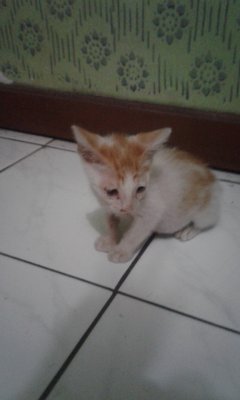My kitten name is Berry. His momma was a feral cat around neighborhood and we like to gave her food whenever she visited us. One day she had 3 kittens, hiding them somewhere.
Then my neighborhood showed me where the kittens were, they're so skinny 4 weeks old kittens and crying for food. I kept looking for their momma and she's sick like almost dying. Then I fostered the kittens gave them KMR. Their momma died at night and I took care the kittens.
A week later another 2 kittens died, berry was all alone.
His condition was up and down, only 270 grams in 5 weeks old. Had very bad flu too and vet gave it antibiotic and vitamins. I also gave it Urgent AD for his weight and his health improve, gain 100 grams in a week, but his flu recovery is very slow.
He's now 3.5 months old ate like a pig , poop normally, play normally, but I concerned with his bloated tummy. It's hard and so big.
There's no parasites, he had deworming already. Vet gave him medicine for tummy gas and told me to watch if it makes a change. So far nothing change after 3 days medication. He has appointment next week for x ray and until then I wonder of what you think.
1. His appetite is like a pig
2. His last weight is 745 grams
3. He's very active and love playing around
4. He breaths normally and doesn't seems bothered of his tummy
5. Tummy is hard after eat a lot. After not eating overnight is still bloated but not too hard.
6. Both vet and I doubt if it's FIP since he got that big tummy for so long
7. He's just sooo tiny. I had 7 weeks foster kitten and their size were almost the same.
8. Poop normally, brown and in shape
9. Still had flu after two months, but now is much much better
I wonder if anyone ever had this case before.
Oh, anyway sorry for my english
Then my neighborhood showed me where the kittens were, they're so skinny 4 weeks old kittens and crying for food. I kept looking for their momma and she's sick like almost dying. Then I fostered the kittens gave them KMR. Their momma died at night and I took care the kittens.
A week later another 2 kittens died, berry was all alone.
His condition was up and down, only 270 grams in 5 weeks old. Had very bad flu too and vet gave it antibiotic and vitamins. I also gave it Urgent AD for his weight and his health improve, gain 100 grams in a week, but his flu recovery is very slow.
He's now 3.5 months old ate like a pig , poop normally, play normally, but I concerned with his bloated tummy. It's hard and so big.
There's no parasites, he had deworming already. Vet gave him medicine for tummy gas and told me to watch if it makes a change. So far nothing change after 3 days medication. He has appointment next week for x ray and until then I wonder of what you think.
1. His appetite is like a pig
2. His last weight is 745 grams
3. He's very active and love playing around
4. He breaths normally and doesn't seems bothered of his tummy
5. Tummy is hard after eat a lot. After not eating overnight is still bloated but not too hard.
6. Both vet and I doubt if it's FIP since he got that big tummy for so long
7. He's just sooo tiny. I had 7 weeks foster kitten and their size were almost the same.
8. Poop normally, brown and in shape
9. Still had flu after two months, but now is much much better
I wonder if anyone ever had this case before.
Oh, anyway sorry for my english
Attachments
-
405.7 KB Views: 407
-
394.3 KB Views: 92




 Your english is fine, my friend, and thank you for caring for this little foundling.
Your english is fine, my friend, and thank you for caring for this little foundling.